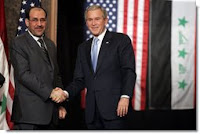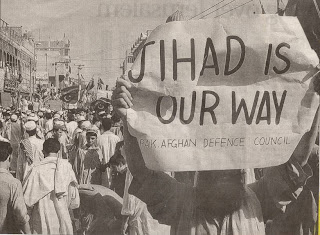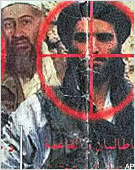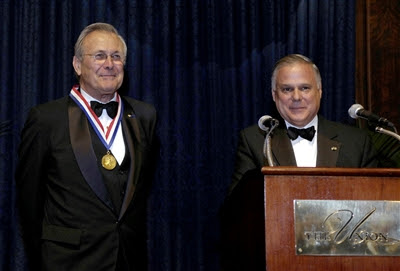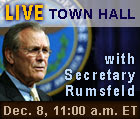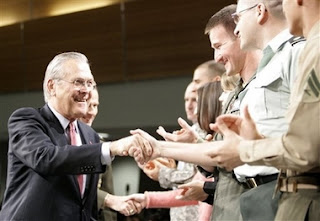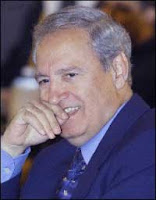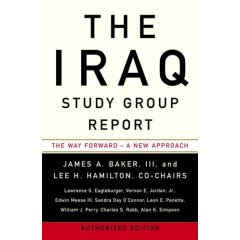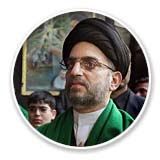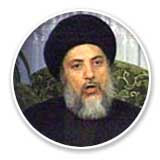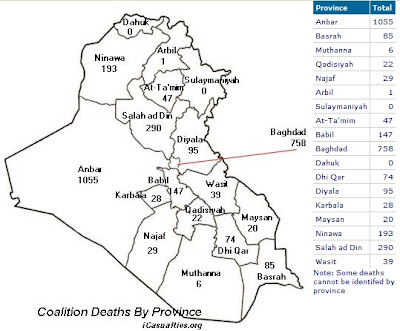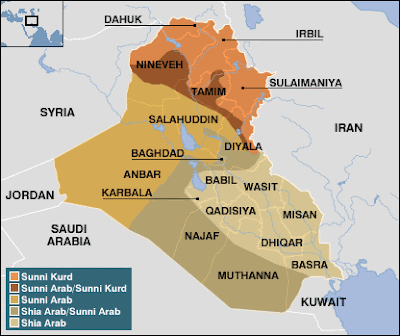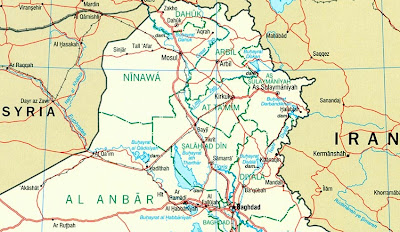That's the only thing that one can conclude, so far, from the series of events, from November to December's end, 2006. Why would you fire a SecDef in the middle of conflict, unless you had a sense that there was something better at hand?
FOREVER YOUNG
The whole "New Policy" meme is starting to look ridiculous. Abjectly so.
The Iraq Study Group was convened nine months ago, now. Hitler's entire campaign into Soviet Russia had its decisiveness judged in a matter of three or four months, practically speaking, if my memory of military history serves. How can it be that the CIC is still "studying" the problem? I'm all for time-outs for re-evaluation, but the NIE estimate from last April was that things would be getting worse - who had the contingency plan?
"STAY THE COURSE", STILL OPERATIVE
One cannot help but feel that stay-the-course is still operative, because Bush is either waiting for al-Malaki to prove himself as the right guy for Iraq on some unknown measure(s) or for facts on the ground to shift in his favor, somehow. Last, he may be waiting for the new Congress in order to stick-it-to-ém with some controversial proposal - who knows, it's hard to believe anything he says, any longer (for me).
'GENERIC NEED' FOR MORE TROOPS - WHAT THE HECK IS THAT!?
Last, but hardly least, the one bit that we are given, without any broader strategy revealed for aligning the government institutions in a grand way to combat and win the fight against extremism, is that the Marines need a larger permanent force-structure.
For more invasions?
I mean seriously, shouldn't one try to win the "war" that is in front of them, before worrying about the "harder choices" of the next generations? Good grief!
BACKGROUND:
President Bush's 'Stay the Course on Policy Change'
Nov 8th, Fires Rumsfeld
Nov 11th, Meets with Israeli PM Olmert
Nov 30th - Meets with Malaki
Dec 6th - Iraq Study group
Dec 11th - Meets with State Department Officials
Dec 12th - Meets with Iraqi VP Hashemi
Dec 13th - Meets with Pentagon Brass
- Quips, "I won't be rushed"
Dec 18th - Swears in Gates
Dec 20th - Announces that large Army is required
"Let me wait and gather all the recommendations from Bob Gates, from our military, from diplomats on the ground; I'm interested in the Iraqis' point of view; and then I'll report back to you as to whether or not I support a surge or not. Nice try."
THE PRESIDENT: Well, I haven't made up my mind yet about more troops. I'm [STILL?] listening to our commanders; I'm listening to the Joint Chiefs, of course; I'm listening to people in and out of government; I'm listening to the folks on the Baker-Hamilton commission about coming up with a strategy that helps us achieve our objective."
More Troops - generically, I mean:
Q Good morning, Mr. President. Your former Secretary of Defense, Donald Rumsfeld, advocated for a lighter, more agile military force. Have you now concluded that that approach was wrong?
THE PRESIDENT: No, I strongly support a lighter, agile army that can move quickly to meet the threats of the 21st century. I also supported his force posture review and recommendations to move forces out of previous bases that were there for the Soviet threat, for example, in Europe. So he's introduced some substantive changes to the Pentagon, and I support them strongly.
However, that doesn't necessarily preclude increasing end strength for the army and the Marines. And the reason why I'm inclined to believe this is a good idea is because I understand that we're going to be in a long struggle against radicals and extremists, and we must make sure that our military has the capability to stay in the fight for a long period of time. I'm not predicting any particular theater, but I am predicting that it's going to take a while for the ideology of liberty to finally triumph over the ideology of hate
Indian Treaty Room, Press Conference
UPDATE:
Dec 28th - Meets with National Security Staff
Jan 10th - Notifies Congressional Leaders, Meets with Press, National TV Speech, Falcon Brigade from 82nd Airborne arrives Baghdad following week

